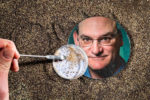Advertise Follow Us
Articles Tagged with ''herbicide''
Novel Sugar From Cyanobacteria Targets Same Pathway as Glyphosate
The newly discovered natural molecule could be as effective as Roundup but potentially safe and non-toxic to humans and animals.
Read More
2018 Farm Progress Show






